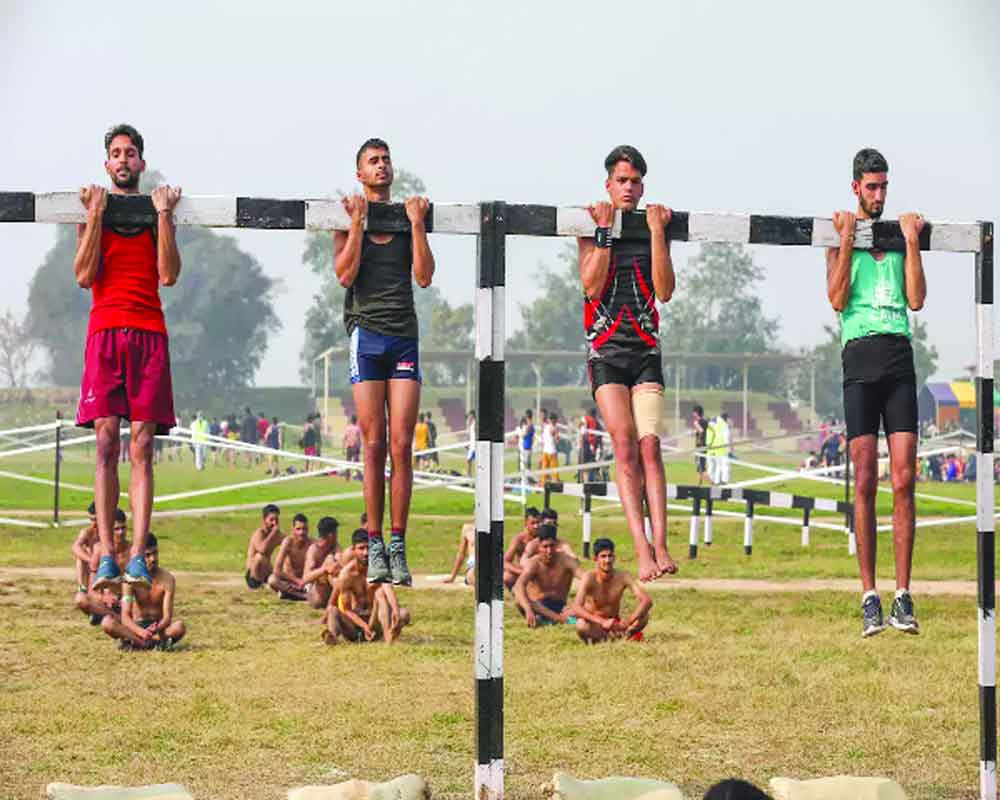The Govt faces an uphill task in meeting expectations of the nation’s youth when economy is experiencing severe recession and job market is unstable
Much water has flown down the Ganges since unveiling of the new human resource policy by the Defence Ministry for recruiting soldiers, sailors and airmen. The country witnessed widespread protests, rioting and violence by youth in many States causing irreparable damage to public property. This abrupt change has not gone well with the youth aspiring to join the armed forces lured by the earlier system of joining service for 17 years and enjoying pension benefits. Taking note of the resentment among the youth and the Opposition encashing upon the unrest, the Government went into damage control and the age limit was enhanced from 21 years to 23 years. Home and Defence Ministries announced 10 per cent reservation to reinstate the retired troops in Central Armed Police Forces (CAPF) forces, defence Public Sector Undertakings (PSUs) and other jobs. Some States also assured job security to Agniveers after their retirement. Indian business magnates justified the Agnipath scheme, claiming that it has large potential for employment.
Senior armed forces officers also sought to clear the doubts. Prime Minister Narendra Modi himself said that some reforms “may look unfair” at first, but will help in nation-building later. He met the three service chiefs to discuss the Agnipath scheme. The Army and the Air Force have since issued recruitment notifications. All these developments indicate that the Government failed to do proper homework before introducing the scheme and is now acting in haste to control the situation.
The scheme has received mixed response from the veterans and public — those in service have supported the decision whereas most retired officers have criticised the move. They have raised apprehensions on various counts like the training duration for Agniveers, whether their motivation level will be as high as that of regular soldiers and the rehabilitation of retired troops. They have also criticised the hasty manner in which the scheme was implemented without putting the scheme to test through a pilot project. To meet the cumulative threat from China and Pakistan, the Indian forces require young, highly trained and motivated soldiers. The pertinent questions are whether the new breed of Agniveers will be able to meet this challenge?
What benefits would the retired Agniveers get? How would the defence forces gain out of this scheme? Critics feel that the first casualty would be the quality of human resources. Any eligible person will first compete for jobs in civilian Government, police and Central forces where she enjoys assured service till the age of 60 years and pension benefits, before opting for the four-year unsecured stint in the armed forces. The second casualty would be training — an Agniveer’s six-month stint will be able to gain him neither any worthwhile expertise in handling expensive military equipment nor understand the nuances of a modern battlefield of artificial intelligence, cyber warfare etc. Poor-quality human resources, inadequately trained and poorly paid Agniveers, lacking any motivation with a broken regimental system, will be a disaster in the making for our armed forces.
The scheme’s supporters hailed it as a path-breaking initiative that would replace an aging Army, in which more than 60 per cent men are above 30 years of age and would pave the way for regular intake and availability of young, fit and motivated youth who wish to don the uniform and serve the nation for short periods. The scheme is expected to open up new opportunities for our youth, boost civil-military fusion and pave the way for becoming worthy representatives of the best regimental traditions of the armed forces. One of the biggest challenges facing the armed forces is the budgetary constraints. Ballooning salary and pension bills have placed enormous stress on the availability of funds for military modernisation. The emphasis of the new scheme is on ensuring a youthful and tech-savvy profile of the armed forces while reducing the overall burden on pension and gratuities. Another logic given in favour of this scheme is that several foreign models were studied before its implementation. The service period ranges from two to eight years with options for active and reservist service in many modern armed forces of the world, such as the US, UK and France. The Israeli army, which is considered to be one of the best in the world, has service of 30 and 20 months, respectively, for men and women.
The Government faces an uphill task of tackling this peculiar situation of meeting expectations of the frustrated youth at a time when the economy is experiencing severe recession and job market is unstable. Unfortunately, the 1.4 million-strong Army has faced neglect by all Governments, defence expenditure being relegated to the “non-plan” category and Finance Ministry, instead of finding ways and means of raising essential, additional funds for national defence, has passed the buck to the armed forces and demanded that they evolve measures for reducing the pension bill. All these lacunae need to be taken care of before it is too late.
(The writer is a senior journalist and Chairman, the Panwar Group of Institutions, Solan, Himachal Pradesh. The views expressed are personal.)


























